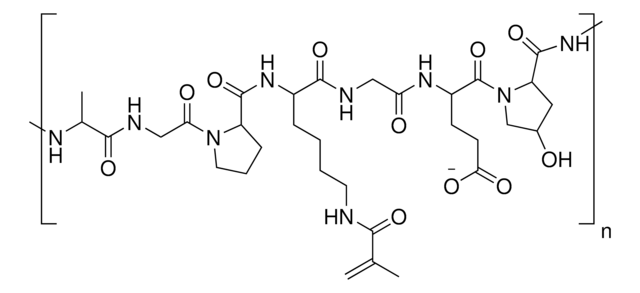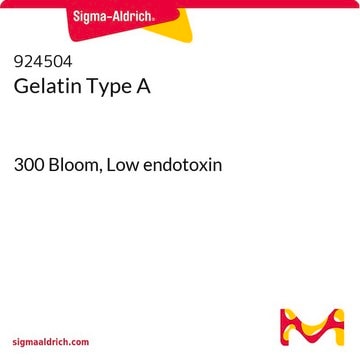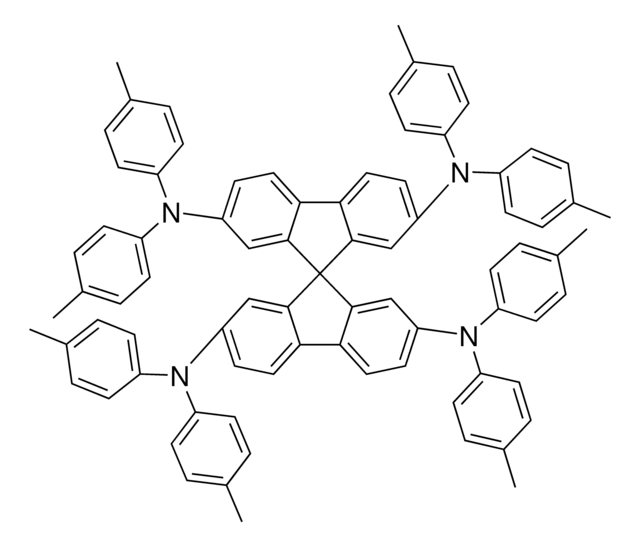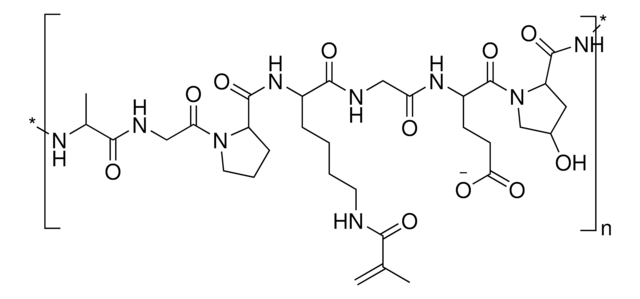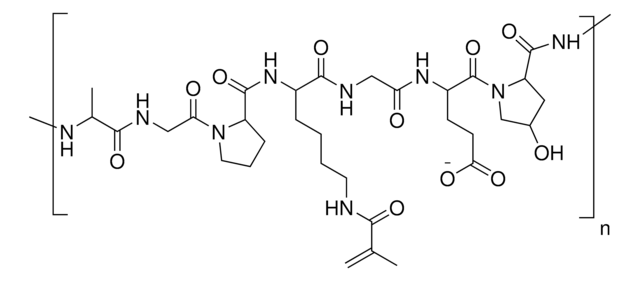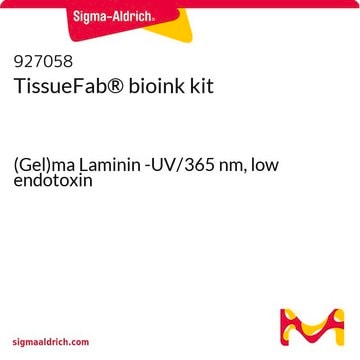938416
TissueFab® Discrete GelMA
170-195 boom, 50% degree of substitution
Iniciar sesiónpara Ver la Fijación de precios por contrato y de la organización
About This Item
Productos recomendados
Quality Level
description
Application: 3D bioprinting, tissue engineering
form
powder or chunks (or fibers)
color
white to light brown
storage temp.
−20°C
Categorías relacionadas
General description
Gelatin methacryloyl, also known as gelatin methacrylate or GelMA, is a methacrylate-functionalized gelatin biomaterial. The gelatin amine groups are chemically modified with methacrylate groups, which when combined with light and a photoinitiator, can be be photopolymerized to form a hydrogel with a three-dimension network that closely mimices the native extracellular matrix (ECM). GelMA is often used as a scaffold for cell culture and tissue regeneration, as it provides a supportive environment for cell attachment, proliferation, and differentation. Its properties, such as mechanical strength, degradation rate, and gelation behavior, can be adjusted by modifying the degree of methacrylation and crosslinking density.
Many GelMAs currently available have a high degree of variation and inconsistency. To address this, the TissueFab® Discrete GelMAs have been developed to achieve a specific degree of methacrylation with low batch to batch variability.
Many GelMAs currently available have a high degree of variation and inconsistency. To address this, the TissueFab® Discrete GelMAs have been developed to achieve a specific degree of methacrylation with low batch to batch variability.
Application
*Tissue engineering - including bone tissue, cartilage tissue, epidermal tissue, and cardiac tissue
*Regenerative medicine - including injectable tissue constructs and endothelial cell morphogenesis
*Drug and cell delivery - in the form of microspheres and hydrogels
*Surface coatings - of medical devices and implants in order to improve biocompatibility and release therapuetic cargos
*Regenerative medicine - including injectable tissue constructs and endothelial cell morphogenesis
*Drug and cell delivery - in the form of microspheres and hydrogels
*Surface coatings - of medical devices and implants in order to improve biocompatibility and release therapuetic cargos
Features and Benefits
*Specific degree of methacrylation - a narrow peak of methacrylation allows for better reproducibility, low batch to batch variability, for improved consistency of gel properties and cell behavior.
*Biocompatibility - GelMA contains RGD sequences, found in collagen and other natural ECM proteins, which promote cell adhesion, proliferation, differentiation, and maturation of a variety of cell types.
*Biodegradability - GelMA contains matrix metalloproteinase (MMP) degradable sites that can be recognized and enzymatically degraded by cells. This allows the encapsulated cells to degrade and remodel the GelMA matrix, and repopulate with their own cells and tissues, a major goal for tissue engineering and regenerative medicine.
*Tunability - The TissueFab(R) Discrete GelMAs are available in a variety of degrees of substitution which ultimately impact the hydrogel stiffness and mechanical properties and can be used to recapitulate and accomodate different native tissues.
*Bioprintability - The TissueFab(R) Discrete GelMAs are widely used in the field of 3D bioprinting due to their unique gelation properties and the ability to print via extrusion and other methods to create intricate cell-encapsulated 3D structures with high cell viability.
*Biocompatibility - GelMA contains RGD sequences, found in collagen and other natural ECM proteins, which promote cell adhesion, proliferation, differentiation, and maturation of a variety of cell types.
*Biodegradability - GelMA contains matrix metalloproteinase (MMP) degradable sites that can be recognized and enzymatically degraded by cells. This allows the encapsulated cells to degrade and remodel the GelMA matrix, and repopulate with their own cells and tissues, a major goal for tissue engineering and regenerative medicine.
*Tunability - The TissueFab(R) Discrete GelMAs are available in a variety of degrees of substitution which ultimately impact the hydrogel stiffness and mechanical properties and can be used to recapitulate and accomodate different native tissues.
*Bioprintability - The TissueFab(R) Discrete GelMAs are widely used in the field of 3D bioprinting due to their unique gelation properties and the ability to print via extrusion and other methods to create intricate cell-encapsulated 3D structures with high cell viability.
Legal Information
TISSUEFAB is a registered trademark of Merck KGaA, Darmstadt, Germany
related product
Referencia del producto
Descripción
Precios
Storage Class
11 - Combustible Solids
wgk_germany
WGK 3
flash_point_f
Not applicable
flash_point_c
Not applicable
Certificados de análisis (COA)
Busque Certificados de análisis (COA) introduciendo el número de lote del producto. Los números de lote se encuentran en la etiqueta del producto después de las palabras «Lot» o «Batch»
¿Ya tiene este producto?
Encuentre la documentación para los productos que ha comprado recientemente en la Biblioteca de documentos.
Cell-laden microengineered gelatin methacrylate hydrogels.
Nichol JW, Koshy ST, Bae H, et al.
Biomaterials, 31(21, 5536-5544 (2010)
Synthesis, properties, and biomedical applications of gelatin methacryloyl (GelMA) hydrogels
Yue K, et al.
Biomaterials, 73, 254?271-254?271 (2015)
Microfluidics-assisted fabrication of gelatin-silica core-shell microgels for injectable tissue constructs.
Cha C, et al.
Biomacromolecules, 15, 283-290 (2014)
Photocrosslinkable gelatin hydrogel for epidermal tissue engineering.
Zhao X, et al.
Advanced Helathcare Materials (2015)
Mineralized gelatin methacrylate-based matrices induce osteogenic differentiation of human induced pluripotent stem cells.
Kang H, Shih YR, Hwang Y, et al.
Acta Biomaterialia, 10(12), 4961-4970 (2014)
Nuestro equipo de científicos tiene experiencia en todas las áreas de investigación: Ciencias de la vida, Ciencia de los materiales, Síntesis química, Cromatografía, Analítica y muchas otras.
Póngase en contacto con el Servicio técnico